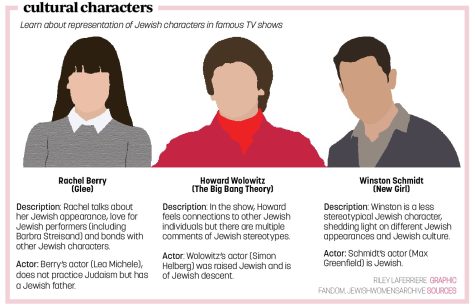
Controversy around anti-semitic comments from celebrities has risen lately. Kanye West made a number of antisemitic comments and tweets late last year. While others like Mel Gibson, Nick Cannon and Miley Cyrus, have also been accused of making offensive remarks over the years. To combat this, organizations have made more conscious efforts to include equal representation. However, the accuracy of the Jewish community’s representation is a concern for senior Elise Varhan, who is a follower of the Jewish faith. Varhan said that stereotypes and misinformation can be spread through the media.
“I feel like there are a lot of extremists. With the Palestinian and Israeli conflict, there were a lot of extreme Israeli organizations that were not exactly being accurate and that would annoy me,” Varhan said. “There is also a lot of media that bias against Judaism, with Kanye and his clothing line, and recently there was a swastika on the New York Times crossword and it’s just not as uncommon as people think.”
In addition to Varhan, Matthew Paraboschi, junior and follower of the Jewish faith, said overall he thinks Judaism is represented more positively than negatively. He said celebrities like West are outliers.
“For the most part I think it is in a positive light, how people are represented. There are definitely people who target Jewish people, but I don’t think anyone is picturing those people in a good light,” Paraboschi said.
Still, Varhan said stereotypes can form from the media and even be represented in children’s movies which engraved these stereotypes into people’s minds from a young age.
“(The media impacts Jewish stereotypes) with or without meaning to,” Varhan said. “There is this whole idea that the goblins from Harry Potter are supposed to represent Jews because they are short, they have big noses, and they are bankers which is another big Jewish stereotype. I mean there is more to it than that. The less harmful (stereotypes) are more shown in the media because you don’t see people saying outrageous stuff on the internet as much as you would see it in person.”
Rabbi Brett Krichiver, who works at the Indianapolis Hebrew Congregation, said sometimes the media can exacerbate stereotypes due to the little coverage certain topics may receive.
“Most of the time right now in the world I don’t think the media is responsible for any of those stereotypes, but what I think happens is that sometimes the media tries to boil things down to a five-second sound bite and some issues you can’t quite boil it down to five seconds,” Krichiver said. “It actually takes a little bit of nuance, patience, and understanding to recognize what’s really at issue there.”
Paraboschi said while he feels he has never personally been affected by stereotypes he is still aware and conscious of their effects.
“There are definitely stereotypes that Jewish people are rich or control the world’s money and stuff,” Paraboschi said. “I don’t think it has really impacted my life too much. Personally, I’m in a position of privilege, but I know people who have been told like ‘they’re Jewish, they must be rich.’”
Varhan said being a part of the Jewish community impacts her perspective on modern-day issues and impacts her identity as it allows her to connect with her friends.
“(Judaism) plays a role (in my identity) because I’m friends with a lot of Jewish people that most people aren’t friends with,” Varhan said. “And I have a perspective that I feel more strongly about things that are anti-semitic than other people do.”
Krichiver said news organizations developing strong relationships with Jewish followers is key to the media representing Judaism accurately.

“There are lots of people who work for the local and national press who know us well, and so when something happens they will call us because they already have a relationship,” Krichiver said. “But it also happens pretty frequently that someone will be writing a story who will reach out to somebody who’s not representative of the community or doesn’t have a good sense of what they are talking about, and sometimes that reinforces pretty bad and negative stereotypes.”
Krichiver said spreading knowledge and taking the time to get to know other cultures is the solution to the media’s misconceptions.
“And right now, unfortunately, anti-Jewish sentiment along with anti-immigrant sentiment, anti-Muslim sentiment, anti-Black sentiment are all forces that are unfortunately alive and well within our community right now,” Krichiver said. “It really takes all of us to develop relationships, getting to know each other to fight it.”

































![AI in films like "The Brutalist" is convenient, but shouldn’t take priority [opinion]](https://hilite.org/wp-content/uploads/2025/02/catherine-cover-1200x471.jpg)








































![Review: “The Immortal Soul Salvage Yard:” A criminally underrated poetry collection [MUSE]](https://hilite.org/wp-content/uploads/2025/03/71cju6TvqmL._AC_UF10001000_QL80_.jpg)
![Review: "Dog Man" is Unapologetically Chaotic [MUSE]](https://hilite.org/wp-content/uploads/2025/03/dogman-1200x700.jpg)
![Review: "Ne Zha 2": The WeChat family reunion I didn’t know I needed [MUSE]](https://hilite.org/wp-content/uploads/2025/03/unnamed-4.png)
![Review in Print: Maripaz Villar brings a delightfully unique style to the world of WEBTOON [MUSE]](https://hilite.org/wp-content/uploads/2023/12/maripazcover-1200x960.jpg)
![Review: “The Sword of Kaigen” is a masterpiece [MUSE]](https://hilite.org/wp-content/uploads/2023/11/Screenshot-2023-11-26-201051.png)
![Review: Gateron Oil Kings, great linear switches, okay price [MUSE]](https://hilite.org/wp-content/uploads/2023/11/Screenshot-2023-11-26-200553.png)
![Review: “A Haunting in Venice” is a significant improvement from other Agatha Christie adaptations [MUSE]](https://hilite.org/wp-content/uploads/2023/11/e7ee2938a6d422669771bce6d8088521.jpg)
![Review: A Thanksgiving story from elementary school, still just as interesting [MUSE]](https://hilite.org/wp-content/uploads/2023/11/Screenshot-2023-11-26-195514-987x1200.png)
![Review: "When I Fly Towards You", cute, uplifting youth drama [MUSE]](https://hilite.org/wp-content/uploads/2023/09/When-I-Fly-Towards-You-Chinese-drama.png)
![Postcards from Muse: Hawaii Travel Diary [MUSE]](https://hilite.org/wp-content/uploads/2023/09/My-project-1-1200x1200.jpg)
![Review: "Ladybug & Cat Noir: The Movie," departure from original show [MUSE]](https://hilite.org/wp-content/uploads/2023/09/Ladybug__Cat_Noir_-_The_Movie_poster.jpg)
![Review in Print: "Hidden Love" is the cute, uplifting drama everyone needs [MUSE]](https://hilite.org/wp-content/uploads/2023/09/hiddenlovecover-e1693597208225-1030x1200.png)
![Review in Print: "Heartstopper" is the heartwarming queer romance we all need [MUSE]](https://hilite.org/wp-content/uploads/2023/08/museheartstoppercover-1200x654.png)




